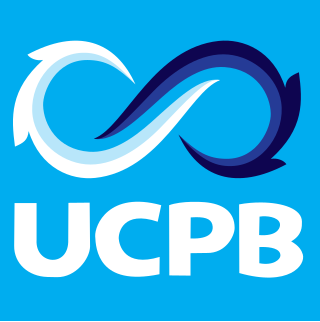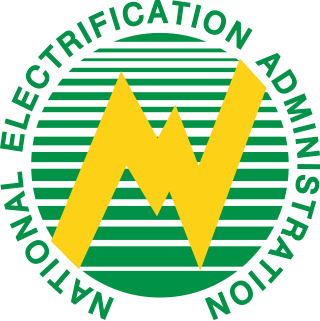
The Export–Import Bank of the United States (EXIM) is the official export credit agency (ECA) of the United States federal government. Operating as a wholly owned federal government corporation, the bank "assists in financing and facilitating U.S. exports of goods and services", particularly when private sector lenders are unable or unwilling to provide financing. Its current chairman and president, Reta Jo Lewis, was confirmed by the Senate on February 9, 2022.

Land Bank of the Philippines, is a government-owned bank in the Philippines with a special focus on serving the needs of farmers and fishermen. While it provides the services of a universal bank, it is officially classified as a "specialized government bank" with a universal banking license.

An export credit agency or investment insurance agency is a private or quasi-governmental institution that acts as an intermediary between national governments and exporters to issue export insurance solutions and guarantees for financing. The financing can take the form of credits or credit insurance and guarantees or both, depending on the mandate the ECA has been given by its government. ECAs can also offer credit or cover on their own account. This does not differ from normal banking activities. Some agencies are government-sponsored, others private, and others a combination of the two.
Equitable PCI Bank, Inc. was one of the largest banks in the Philippines, being the third-largest bank in terms of assets. It was the largest bank before it was overtaken by Metrobank in 1995. It is the result of the merger of Equitable Banking Corporation and Philippine Commercial International Bank or PCIBank. It was known for a wide range of services from savings to insurance and, through its wholly owned subsidiary Equitable Card Network, was the largest Philippine credit card issuer. The bank merged with Banco de Oro Universal Bank in early 2007, and is now branded as BDO as its new identity as part of the new Banco de Oro Unibank, Inc.
The Commodity Credit Corporation (CCC) is a wholly owned United States government corporation that was created in 1933 to "stabilize, support, and protect farm income and prices". The CCC is authorized to buy, sell, lend, make payments, and engage in other activities for the purpose of increasing production, stabilizing prices, assuring adequate supplies, and facilitating the efficient marketing of agricultural commodities.

Overseas Filipino Worker (OFW) is a term often used to refer to Filipino migrant workers, people with Filipino citizenship who reside in another country for a limited period of employment. The number of these workers was roughly 1.77 million between April and September 2020. Of these, female workers comprised a larger portion, making up 59.6 percent, or 1.06 million. However, this number declined to 405.62 thousand between 2019 and 2020.
A loan guarantee, in finance, is a promise by one party to assume the debt obligation of a borrower if that borrower defaults. A guarantee can be limited or unlimited, making the guarantor liable for only a portion or all of the debt.

The United Coconut Planters Bank, more popularly known by its initials, UCPB, or by its old name, Cocobank, was a government-owned bank and was one of the largest banks in the Philippines, ranking within the top twenty banks in the country in terms of assets. It was the only existing universal bank not listed on the Philippine Stock Exchange. The bank, owing to its name, catered heavily to coconut farmers, but also served a wide-ranging clientele.

The Philippines' National Food Authority, is an agency of the Philippine government under the Department of Agriculture responsible for ensuring the food security of the Philippines and the stability of supply and price of rice, the Philippines' staple grain.

The Philippine Coconut Authority is an agency of the Philippine government under the Department of Agriculture responsible for developing the coconut and other palm oil industry to its full potential in line with the new vision of a united, globally competitive and efficient industry.
The Export–Import Bank of China is one of two institutional banks in China chartered to implement the state policies in industry, foreign trade, economy, and foreign aid to other developing countries, and provide policy financial support so as to promote the export of Chinese products and services.
The Coco Levy Fund Scam was a controversy in the 1970s and 1980s in the Philippines involving former President Ferdinand Marcos and his cronies. It was alleged that Marcos, Danding Cojuangco, Juan Ponce Enrile, and others conspired to tax coconut farmers, promising them the development of the coconut industry and a share of the investments, but on the contrary used the collection fund for personal profit, particularly in the purchase of United Coconut Planters Bank (UCPB) and a majority stake in San Miguel Corporation (SMC), to name a few.
In the Philippines, a government-owned and controlled corporation (GOCC), sometimes with an "and/or", is a state-owned enterprise that conducts both commercial and non-commercial activity. Examples of the latter would be the Government Service Insurance System (GSIS), a social security system for government employees. There are 219 GOCCs as of 2022. GOCCs both receive subsidies and pay dividends to the national government. A government-owned or controlled corporation is a stock or a non-stock corporation, whether performing governmental or proprietary functions, which is directly chartered by a special law or if organized under the general corporation law is owned or controlled by the government directly, or indirectly through a parent corporation or subsidiary corporation, to the extent of at least a majority of its outstanding capital stock or of its outstanding voting capital stock.

The Philippine Space Agency (PhilSA) is the national space agency of the Philippines.
CIBI Information, Inc. or CIBI, formerly known as Credit Information Bureau, Inc., is the first and the only local credit bureau in the Philippines. CIBI started as a government entity under the Central Bank of the Philippines Department of Loans and Credit to initiate a credit information exchange system in the country. Founded in 1982, CIBI was established through the power of Presidential Decree 1941 created under Central Bank of the Philippines, now Bangko Sentral ng Pilipinas (BSP); the Securities and Exchange Commission (SEC) and the Financial Executives Institute of the Philippines (FINEX)

Carlos "Sonny" García Domínguez III is a Filipino businessman and former chief executive of Philippine Airlines who served as the 31st Secretary of Finance under the Duterte administration. He had previously held the position of Secretary of Agriculture and Minister of Natural Resources under the Corazon Aquino administration. Prior to his appointment to President Duterte's Cabinet, he had served as executive director of PTFC Redevelopment Corp., as independent director of Alsons Consolidated Resources, and as director of United Paragon Mining Corp. His family owns Marco Polo Hotel in Davao City, one of the top hotels in southern Mindanao.

The Housing and Urban Development Coordinating Council (HUDCC) was the umbrella agency of various housing and development offices of the Philippine government. It was established by President Corazon Aquino through Executive Order No. 90, Series of 1986.

The National Electrification Administration is a government-owned and controlled corporation (GOCC) attached to the Department of Energy of the Philippines tasked in the full implementation of the rural electrification program (REP) and reinforce the technical capability and financial viability of the 121 rural electric cooperatives (ECs).

The Department of Human Settlements and Urban Development, abbreviated as DHSUD, is the executive department of the Philippine government responsible for the management of housing and related development in the Philippines. The department is led by the Secretary of Human Settlements and Urban Development, as appointed by the President of the Philippines and confirmed by the Commission on Appointments. The secretary would be assisted by three Undersecretaries and three Assistant Secretaries, that would be appointed by the President upon the recommendation of the Secretary.
The Export-Import Bank of India is a specialized financial institution in India that was established in 1982. The bank's primary function is to finance, facilitate and promote India's international trade. It is owned by the Government of India and operates as a statutory corporation. Its operations are governed by the Export-Import Bank of India Act, 1981.












